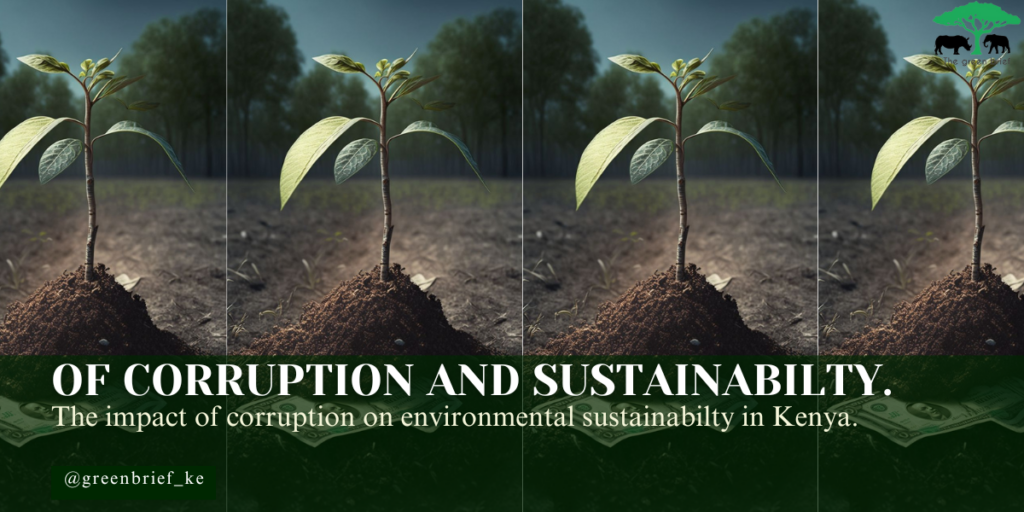The term ‘corruption’ is related to poverty, ineffective legislation, and uncertainty. In reality, its negative implications go well beyond this and have a huge negative impact on environmental sustainability and conservation management. Corruption in the environmental sector which can occur at any step of the resource exploitation process may have disastrous consequences. Such corrupt practices may include embezzlement during the implementation of environmental programs, grand corruption and bribery in issuing of permits for natural resource exploitation, and petty bribery of law enforcement officials to allow for poaching in protected areas and reserves. These violations, whether committed at the international, national, or local level, can lead to the loss of resources and habitats, as well as the degradation of ecosystems, affecting the livelihoods of local communities both directly and indirectly. Furthermore, widespread corruption poses a significant barrier to humanity’s efforts to combat climate change thus negatively impacting environmental sustainability.
Take Kenya, for example, corruption in the environmental sector has greatly impacted environmental sustainability efforts. For instance, illegal logging and charcoal burning motivated by corrupt practices has ravaged vast areas of indigenous forests, including the Mau Forest Complex. Corrupt government officials who in one way or the other benefit from the proceeds of these illegal acts have frequently been complicit, either by turning a blind eye or directly facilitating these illegal activities. This has resulted in widespread deforestation, biodiversity loss, and disruption of water catchment areas that are critical for agriculture and water supply.
Another example is mismanagement of funds that are allocated for wildlife conservation, where rampant embezzlement by a few government officials more so from the agencies charged with protection of our flora and fauna has resulted in inadequate resources to combat poaching. This form of corruption has contributed to the decrease in endangered animals such as elephants and rhinos, endangering biodiversity and the tourism, which is an important economic sector in Kenya.
Another key area of concern is waste management. The improper disposal of toxic waste due to lax enforcement, potentially influenced by bribery, has led to the contamination of water sources and caused harm to human health. A perfect example is the Nairobi River. Many industries along the river have unfortunately bribed and corrupted environmental officials within the city, which actions have led to the officials turning a blind eye as the factories release their toxic wastes directly into the river. This not only poses a health risk but also discourages sustainable practices like ecotourism that rely on clean environments.
Corruption in the environmental sector has also come in the form of embezzlement of funds meant for certain sustainable environmental projects. A key example is the Arror and Kimwarer Dam 63 billion scandal. The scandal which was orchestrated in a well planned and deliberate irregular procurement practices saw the Former Treasury Cabinet Secretary and 8 other officials from the ministry charged in court. However, they were acquitted for lack of sufficient evidence to sustain the charges that were leveled against them. In as much as the alleged officials were duly acquitted in a court of law, this does not negate the fact that money meant for the construction of a dam, that would have helped in creating a sustainable water management system was lost. The dam would have helped in irrigation as the country struggles with drought and erratic rainfall patterns.
From the listed examples of corrupt practices in the environmental sector in Kenya, it is clear that this vice has taken a major toll on environmental sustainability in Kenya. Therefore, in order to tackle this menace, it is crucial that we enhance transparency, accountability, democracy and uphold the rule of law. In Kenya, there are a number of statutes that speak against corruption in all sectors, however, the real issue is the lack of political goodwill to fight this vice. Politicians and policy makers both generally and in the environmental sector need to be committed in strengthening the legal framework and the relevant environmental institutions so as to weed out this vice.
Nonetheless, it is critical not to undermine the role of foreign public and private partners, who must agree not to exploit natural resources through any corrupt and illegal means. Furthermore, local communities and the general public who consume relevant products can increase transparency in the process by inquiring about how and with what kind of environmental impact such products or results.
If you want to learn more on how you can help fight corruption through memorandum writing, we have a training for you. Click here! to register.
